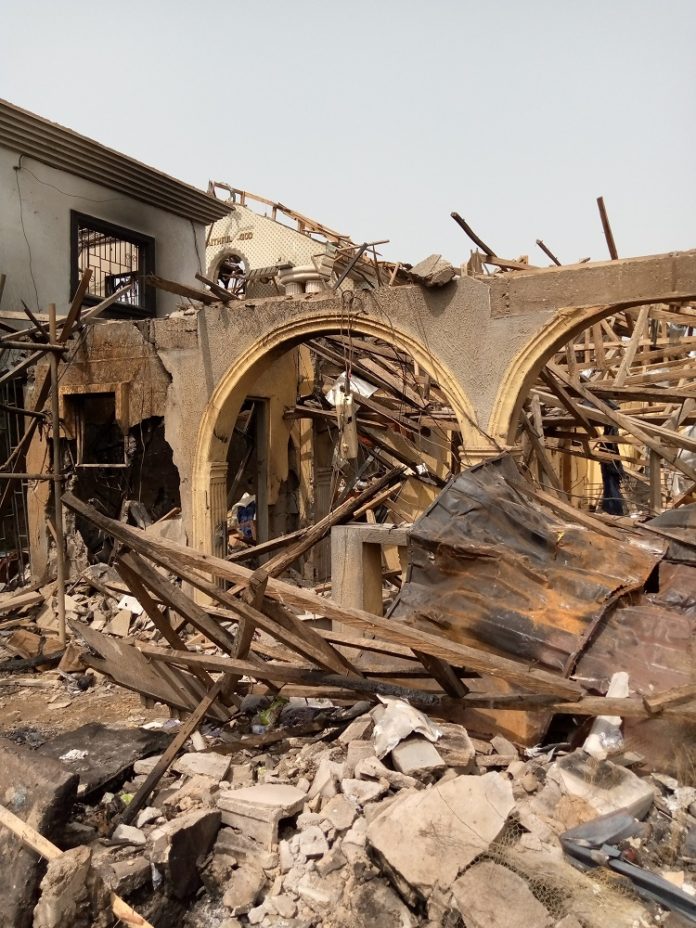By Emeka Alex Duru
The picture that easily comes to mind is that of Aleppo, in Syria or Mogadishu, capital of Somalia, both torn by years of internecine warfare and terrorist activities. Even the road to the scene, an intersection from the popular Abule-Ado Bus Stop, on Lagos – Badagry Expressway, speaks of the deep pain in the environment. In ordinary time, both sides of the Bus stop, are alive from morning till night. Not so, now, particularly on the side leading to Ado-Soba, the site of the explosion that rocked the neighbourhoods and beyond, last Sunday, March 15.

On this Monday, a day after, Ado-Soba end, lost its trademark bustle and bubble. The usual traffic, occasioned by ubiquitous taxi drivers, tricycle (Keke) and reckless commercial motorcycle (okada) operators, had disappeared. For the keke and okada men who seemed to have disregarded the earlier directive by the Lagos state Government banning their operation in the area among other routes, it was time to play safe and not to be caught in the foul mood of the day. They were not in business. As with the keke and okada operators, owners of the make-shift kiosks and umbrella sheds, who also caused obstruction on the road, were not in sight. In their places, were various segments of military and paramilitary personnel.
Long walk to the blast site
The sordid mood of the day, reflected in people trooping in and out of the long road, heads bowed, exchanging occasional banters but largely in whispers. Not the scorching sun of the day would deter curious visitors from trudging to the over three-kilometre journey to the scene of the blast. Occasionally, scruffy-looking sachet water vendors would dash out of the road, hand out one or two packs to thirsty clients, collect their money and dash back to their mini depots, in a jiffy. It was, indeed, a long trek. But the inquisitive and concerned Nigerians were not deterred. They wanted to feel the sites and scenes of the blast. They wanted to see things for themselves. They went, they saw, and were humbled by the magnitude of the devastation. You would begin to feel the impact of the blast about 500 meters to the scene. Houses in adjacent streets with walls and roofs in various levels of shatters, signposted the bigger story ahead.
People, property, consumed
Between 50 and 100 meters at all ends of the centre of the blast where Nigerian National Petroleum Corporation (NNPC) Pipeline ran through, all the buildings suffered various layers of devastations, never to be inhabited again in their current shapes. Most, were completely reduced to the rubbles or virtually burnt out. A popular mission school, Bethlehem Girls College, operated by the Catholic Church, was impacted heavily. The Principal Rev. Sister Henrietta Alokha, died, trying to rescue her wards. More than 60 students of the College, were affected by the blast. At the Navy Reference Teaching Hospital, Ojo, where they were rushed to, many were stabilized. 21 persons were officially recorded to have been killed in the incident, with scores injured.
Residents buried in the rubbles?
By Monday afternoon, survivors insisted that many may have been buried in some of the submerged buildings. Cyracus Nweze, one of the residents, swore to our correspondent that he was sure of a particular family that may have been buried in the rubbles of their building. “I was going out when I saw them driving in. I suspected they may have attended 6.00 AM Mass. It was not up to 30 minutes when they drove past me that the blast occurred. Their house was very close to the centre of the blast. I have not heard anything about them subsequently. I fear for them”, he said. That was the fear by many on residents who were in their houses at the time of the blast. The apprehension is that by that time, around 9.00 AM, many Christians, among them, would either be returning from first mass/service or preparing for the second session.
There could be substance in the fear. By Monday, for instance, while an earth mover busied with rummaging sites of collapsed or submerged buildings, a little girl of about three years was salvaged from one of the rubbles. The ululation that trailed the rescue, was however drowned by anguish that accompanied the recovery of three bodies. They had died.
Lamentations all the way
Elsewhere, a middle aged woman, whose husband and two of her children were caught in the blast, cried uncontrollably. They were lucky to have come out alive. But for her, the Sunday incident, adds to the series of the misfortunes the family had encountered this year. The husband, according to stories in the site, lost two of his Shops to the inferno that engulfed Balogun Market, Lagos, earlier in the year. Having been dislodged in Balogun, he turned his house into a warehouse from where he dispatched goods to clients. He had just unloaded a container of goods into the warehouse two days before the blast. The building, was mangled by the blast and everything, including household utensils, lost to fire. The other members of the family are currently putting up with a relation in FESTAC Town. They have become destitute overnight.
Another woman, who, it was gathered, was brought to the scene by two of her brothers, after several insistence, got to the site that previously hosted their house, barely recognised the rubble it had turned to, took a deep sigh, looked up to the sky and sunk into the arms of her escorts. She was taken away.

What caused the blast?
There were other sights of erstwhile house owners in piteous postures. What added to their pains was that more than 48 hours after the blast, no precise explanation had been offered on what happened. NNPC claimed that the explosion was caused by a truck after it hit some gas cylinders stacked in a gas processing plant located near NNPC’s 2B pipeline right of way. The Group General Manager Public Affairs, Kennie Obateru who made the explanation, however, did not identify who drove the truck, what the truck was doing on a pipeline at that time of the day. He also did not say whether the content of the truck was weaponized. There were other gaps in the explanation.
A Non-Governmental Organisation, the Environmental Rights Action/Friends of the Earth Nigeria (ERA/FoEN), has therefore observed that there are questions begging for answers on the NNPC position. Deputy Executive Director of the organisation, Akinbode Oluwafemi, said the explosion could be likened to some military aerial bombardment and did not sound like pipeline explosion.
“There is something suspiciously different about this explosion. The scale of destruction is nothing like any of the pipeline explosions we have monitored and documented for several decades.
“The Sunday incident’s scale of destruction could only be likened to military grade explosions or aerial bombardment. We can’t treat this casually as an accident caused by a truck”, he was quoted to have said, in a statement. He argued that it is only a forensic investigation on the explosion that would unravel the cause.
At the blast site and elsewhere, there were insinuations that the explosion must have been triggered by a high caliber bomb. A Political Scientist, Dr. Joseph Nwagu, was not convinced that what happened in Abule-Ado was mere gas explosion. “Truth be told this blast looks almost like that of Ikeja in terms of reach and devastation. It’s more like bombs that went off “, he stated. A retired Army Major, who asked not to be mentioned, was emphatic that it was only a high caliber bomb that could wreck such havoc in Abule-Ado.
How did the residents get the necessary approvals to build in the area, with some even erecting their houses, close to the NNPC Pipeline right of way, TheNiche asked some of the residents. The answers were not forthcoming. It was however gathered that as in most cases in Lagos, many of the houses do not have Certificates of Occupancy (C of O). The implication, according to experts, is that they may have not been insured. In that case, they may just have gone with the bang. This is an aspect that adds to the pains of displaced Abule-Ado residents.













